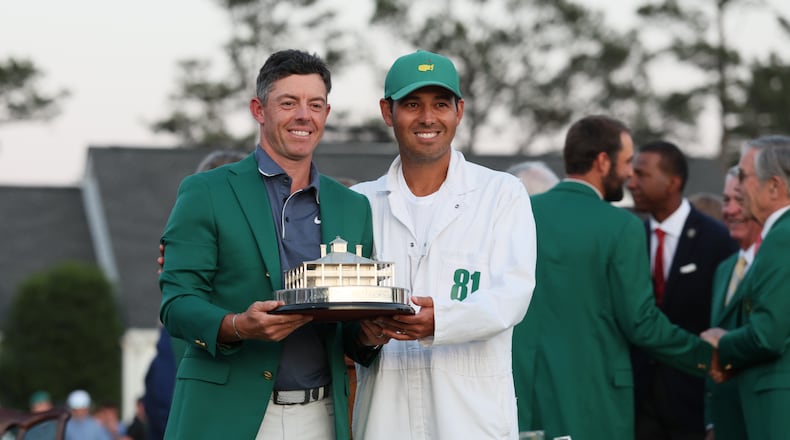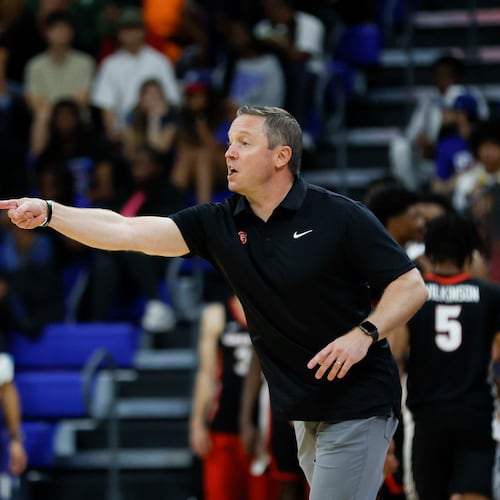AUGUSTA — On a glorious Georgia spring afternoon, Charlie Brown kicked the football.
It was dicey at times. No one could have been blamed for fully expecting that, before the sun set on Augusta National Golf Club on Sunday, Rory McIlroy would do another cannonball into a pool of heartbreak. McIlroy said he wondered himself during the back nine if he had let another chance slip away.
But, bless him, McIlroy won his first Masters on his 17th try, many of the previous 16 starting with him as a favorite to win and ending with disappointment, often the result of self-inflicted damage. It was not for nothing that I wrote a column earlier this week asserting that his seemingly inevitable collapses at the Masters made him an Atlanta sports franchise unto himself, the Atlanta Rorys.
But, teetering on the edge of another crushing loss, McIlroy rose like another Atlanta symbol, the phoenix. It was a wild day. Ahead of final-pairing partner Bryson DeChambeau by two shots at the start of the day, he lost the lead, gained it back, built on it to a point that victory seemed within safe reach, collapsed and lost the lead, fought back for the lead and then fell into a playoff by bogeying the 18th hole when a par would have won him the Masters.
“I certainly didn’t make it easy,” he said.
But on the first playoff hole, the par-4 18th, with 125 yards to the pin, McIlroy ripped a perfect gap wedge to four feet, setting up a birdie for the championship and a share of golf immortality.
Besides winning the 89th Masters, McIlroy became only the sixth player to capture all four professional majors. The 35-year-old from Northern Ireland becomes the second non-American to win the career Grand Slam.
Anyone who has felt the heartbreak of watching Atlanta teams repeatedly fall short understood McIlroy’s visceral reaction upon winning, falling to his knees on the 18th green, clutching his head in his hands, his body shaking with what looked like sobbing.
“That was all relief,” McIlroy said. “There wasn’t much joy in that reaction. It was all relief.”
There were moments from the day that I’ll long remember. I ran into Army football coach (and former Georgia Tech assistant) Jeff Monken and his family on the second hole. I saw baseball Hall of Famer and budding photographer Ken Griffey Jr. near the 12th tee, on assignment for Augusta National. I saw a man ask another fan what it would take to buy the green Masters hat on his head, quickly raising his offer up to $400 before giving up.
This is another: At the par-4 11th, McIlroy’s approach shot came rolling up toward the green but started turning toward a bank fronting the greenside pond. Unease arose in the stands beside the green before the ball finally safely came to rest.
Then came the other approach shot, which splashed into the pond. Part of the fun of attending the Masters is that, with phones banned, scoreboards updated by hand and views on the hilly course sometimes limited, the gallery often is the last to know what is happening. In this case, fans who watched the two shots were uncertain whose ball was whose — who had averted danger and who was about to get a taste of bogey or worse?
And when McIlroy pulled up at the ball above the bank, indicating that that was his shot, cheers broke out. McIlroy said later that he even considered running up to the ball to hit it before it might roll into the water.
The clear favorite of the gallery had dodged a bullet while DeChambeau, already down five strokes, appeared to have suffered a critical blow, only exacerbated when he double bogeyed to fall six strokes back. It was one of many breaks for McIlroy, who has met his share of bad luck on this course.
“I’ve rode my luck all week,” McIlroy said. “And, again, I think with the things that I’ve had to endure over the last few years, I think I deserved it.”
When DeChambeau bogeyed the par-3 12th and Rose appeared to have too few holes left to make a challenge, it looked like McIlroy was all but home free.
There were three friends from Northern Ireland sitting in front of me in the stands, and I thought karma had rewarded me for walking the course rather than watching from the press center. I could ask them about what a McIlroy victory would mean — which I think we all thought that was practically at hand — and I could have a unique and meaningful voice in this column.
Chums for about 40 years, Tom Snoddon, Steve Duncan and Michael Hogg of Lisburn (outside of Belfast) had traveled here to support McIlroy, whom Snoddon hailed as an ambassador for their country. I asked him what they would do Sunday night if McIlroy won.
“We’re not going to remember (Monday),” he said.
I should have been the last person to know better than to tempt fate. The Atlanta sports vibes seemed to trigger McIlroy’s collapse.
But, as it turned out, victory came at long last for McIlroy, well deserved and well appreciated.
In his news conference, he spoke of the burden of continually falling short at Augusta and not winning a major since 2014 after winning four in four years and not being sure he would ever win a green jacket but continuing to believe in himself and persevering despite the lack of results.
“You have to be the eternal optimist in this game,” he said.
And this: “It’s a dream come true. I have dreamt about that moment for as long as I can remember.”
For doubters everywhere, a heartwarming reminder that there’s hope for all of us.
About the Author
Keep Reading
The Latest
Featured


